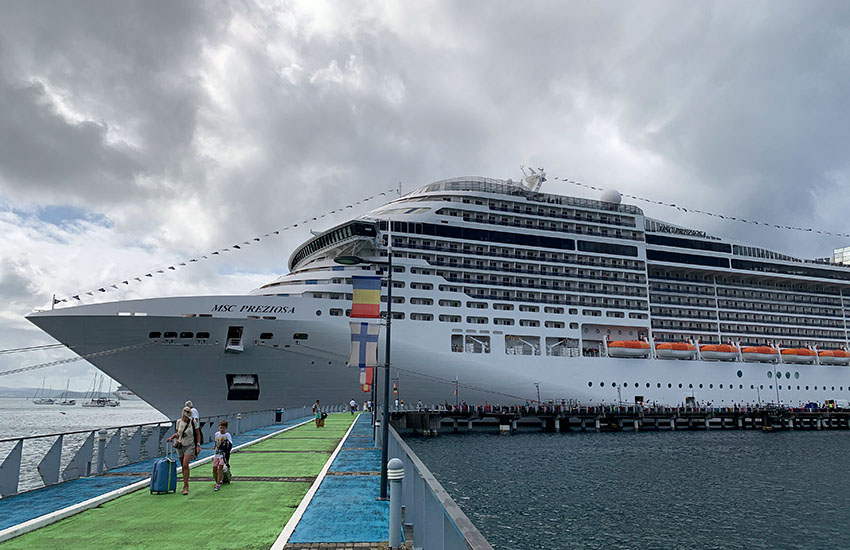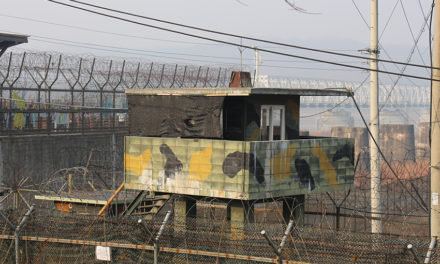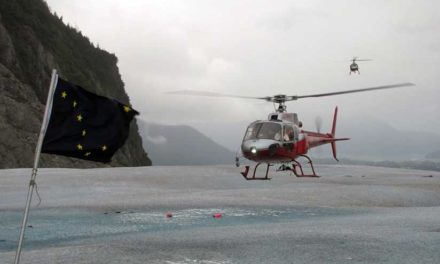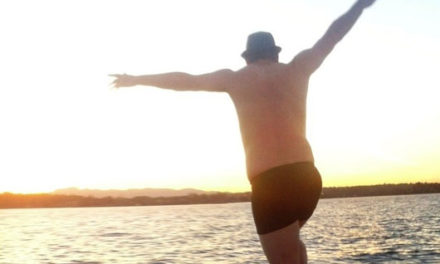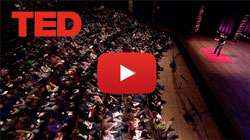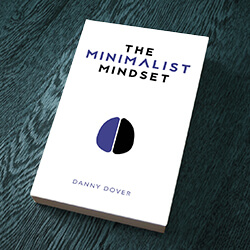With a menacing hiss, recirculated air eerily blew into my small bedroom through the tiny vent in the floorboard underneath the bathroom door. My interior cabin had no window. I was on a 3,700 person cruise ship deep in the middle of the Caribbean and had no way to escape.
Rewind one month. I lay on my back on the floor of my living room. I was recovering from spine surgery after having been bedridden for the previous two months. Low in my spine, two herniated discs pinched the nerve that ran down to my right leg. The pinching of the raw nerve tricked my brain into making my right leg feel like it was both being burned and pulled apart at the same time. My only reprieve was lying flat on my back and not moving. The isolation and lack of movement were causing noticeable damage to my mental health. The hopelessness of depression was creeping back in for the first time in ten years. The void was getting closer. Desperate for some kind of real relief, I plotted.
Given the precarious state of my not quite healed spine, I knew full well that I wouldn’t be able to do any rigorous activities. I settled on a lowest common denominator solution, a cruise ship.
As part of my Post-Life List pursuits, I had been tracking a specific set of cruises for two years. I had identified a particular cruise that maximized the dollar spent per country visited ratio, meaning it would optimally mix the most amount of UN-recognized countries for the least amount of cost. During 15 days, it would visit 15 different ports in 8 different countries.
I booked the cruise and laid back for another stagnant night on the couch.
The next morning, I started to read some of the first US mainstream news articles about the Coronavirus in China. The articles detailed a hospital built in 10 days and a totalitarian government that was forcing people to scan their temperatures and associate it with a government-mandated mobile phone app. Like many of the mainstream English speaking media, the article was written to emphasize how different China was from the western world. The coverage mocked the foreign government and its seemingly lemming-like citizens. The virus was alien, and it couldn’t have seemed farther away.
As my cruise date approached, the stories became more relatable. The virus infected and started to kill some of the elderly residents of a nursing home that was 20 miles from me.
Later, a cruise ship was docked off the coast of San Francisco, and the Vice President was intervening to try to bring the quarantined passengers to the mainland.
The US media went ballistic over the story of the first death in the United States, which had happened right outside of Seattle. Hyperbole filled the news aggregators sites, social media, and my text message stream. Misleading and outright doctored photos of a Seattle devoid of people spread rampantly to humanity’s information consumption devices.
Friends from all around the world contacted me to ask how it felt to be in the ghost town that was Seattle. The previous night I had gone to a bar, and it was full. Driving home in an Uber, we got stuck in traffic at close to midnight. The media was falsifying the reality of Seattle’s reaction to the virus.
With my cruise forthcoming, I weighed my options with my friends and family.
The virus was spreading, and it was possible that my ship would either be denied entry from one or more of its intended ports and that I might need to quarantine in my cabin. I read reports about a poorly executed quarantining of a cruise ship in Japan. I reasoned that while I still might be denied entry to a port or two, it was unlikely that the botched quarantining of a cruise ship would be repeated. I checked the website of my intended cruise line, and they reaffirmed their commitment to drastically increasing their cleaning efforts of the ship and to provide hand sanitizer in all common areas on the ship.
I reread some of the ongoing virus articles online and again was inundated with exaggerations and outright lies. The status of Seattle was greatly embellished, so I reasoned the virus’s threat must be being embellished as well.
I made my decision. There was a risk involved with going, but the anticipated benefits to my mental health seemed like they would outweigh the risks.
I flew from Seattle to Fort-de-France, Martinique. Due to my spine problem, this venture was one of the first non-medical instances of me leaving my house in nearly four months. I eased my shoulders and let a smile overtake my face. It felt great to be out doing something again.
I could see my new temporary home from the plane, the MSC Preziosa, a Fantasia-class cruise ship that could comfortably hold 4,345 passengers.
Almost immediately, I made an avoidable mistake.
I walked up to a taxi outside the airport and allowed the driver to put my bag in his car’s trunk. I told him my destination and let myself into his car.
He pointed at his meter and said in broken English, “meter broken.”
Damn it. My travel skills were rusty. Clearly, I should have started the negotiation before my bag was in the now-closed trunk of the taxi.
In English, I asked how much it would cost to go to the port. In half-English, half-French, he replied, “trois… two… twenty euro”. “Err, trios, trente euros.”
Feebly, I tried to barter him down. He looked at me blankly and started driving.
Feeling like a fool, I agreed to the ripoff, and the driver took me to the ship. It was clear that my basic travel skills, having been unused for many months, needed some maintenance.
The first few days I spent on the ship were the best and most productive days I had had in over a year. By day three, I had already read two books and had finished a detailed outline of my forthcoming book. The words poured out as I wrote chapters. I blew my diet on days one and two, but by day three had settled into a healthy routine that included a healthy mix of vegetables and cardio.
By day four, I started getting texts about Trump’s reactions to COVID-19. The text messages quoted his nationwide broadcast, where he stated that “we will be suspending all travel from Europe to the United States.” A bit unnerved, I Googled the story. The newest claim was the now typical exaggeration that I had come to expect from Trump and the media that was supposed to be keeping him in check.
Despite his own words, his administration hadn’t canceled all flights from Europe. In fact, it hadn’t canceled any flights from Europe. Instead, his executive order was disallowing foreign nationals from flying to the US from countries in the Schengen Area. It was very similar to the order he had already made to disallow foreign nationals from flying to the US from mainland China. Predictably, these facts weren’t reflected in the article headlines; instead, they were buried two-thirds of the way down news articles, a place few social media influencers ever see.
I sighed. It was unclear to me who was the bigger scammer, the editors who wrote mainstream headlines, Trump who provoked them, or lemming-like social media addicts that permeated my social circle and country. These headlines became the same fodder that countless people would share on social media to gain likes and reactions. It was a damaging loop that was wearing me thin.
I closed my laptop and walked out into the sun. Living in Seattle, it was amazing how quickly and how often I forgot how wonderful the sun felt on my skin. It was a form of medicine that I was severely lacking.
Trump’s repeated crying wolf had trained me to not listen to his warnings.
I reassured myself that the spreading virus wasn’t supposed to be deadlier than the common flu. I was young, COVID-19 wouldn’t affect me.
I was served a Pina Colada, and I laid down under the sun to listen to an audiobook. I was happy living in my alternative reality.
Back in the United States, the medical community continued to sound the alarm about the virus. Spreading misinformation about the characteristics of the virus was acting to spread the virus itself. Like other Coronaviruses, it was spreading through the air, but unlike other coronaviruses, some of its carriers were contagious before they became symptomatic. It was a dangerous setup.
Experts in supply chain logistics also sounded their alarms. An enormous increase in just-in-time delivery arrangements had brewed a perfect storm of its own. With factories shut down in China, critical medical supplies were starting to run low at hospitals worldwide. A lack of stockpiling of life-saving prescription drugs and essential medical equipment started to stand out as a dangerous omission.
The dire results were first shown in Italy. COVID-19 victims quickly overtook the hospitals in the northern part of Italy. The exponential growth of the number of patients, a dwindling amount of critical medical equipment like ventilators, and a decreasing amount of healthy doctors devastated Italy’s people and collective consciousness. The Italians started to sound their alarms.
The number of countries closing their borders to foreign nationals jumped drastically overnight.
As I walked around the ship, I heard snippets of conversations about the virus. “It is no deadlier than the flu…” “people are overacting,” “it isn’t a danger to young people.” Misinformation was abounding. People had an understanding of the virus that was weeks old in an environment where the status of the world was changing on a nearly hourly timeframe.
After the second ship in Princess Cruises fleet was quarantined, Princess Cruise Line ceased all operating cruises for 60 days.
This story stuck out to me. Princess Cruises, in doing this, voluntarily took on massive financial losses.
I wondered aloud, “why would they do that?” This was very unusual for a publicly-traded company. They must know something important. They, too, were sounding their alarm.
I bit my lip and went to the homepage of MSC, the cruise line that I was currently sailing with. In a blog post created the day prior, they listed the cruises that they were canceling. At the bottom of their list was the ship I was currently on.
I was sailing on a canceled cruise.
Outside at one of the many bars, a man with a broad smile banged on steel drums while passengers enjoyed their unlimited drink packages and relaxed nearly without care.
I immediately thought back to my experience of getting ripped off by the taxi driver. I had to bring better skills to my immediate problem. I was currently sailing on a doomed ship.
I checked our itinerary and assuming the disembarkment of all passengers on-board my ship and others, I rushed to find a plane ticket out of my ship’s next planned stop. I also booked a cancelable hotel room on the island as a backup plan and base of operations. I guessed that as soon as the information that I had just received was made known to the rest of the ship’s occupants, plane tickets and lodging would be bought up nearly instantaneously.
I quickly found a flight and attempted to sprint through the checkout process. Each page load felt like an hour. The satellite-based Internet had tied an anchor to my efforts to leave.
I made it to the checkout process’s final page and a dialog that asked if I wanted to change my credit card home country to something other than the nearby port of Martinique. Having a US-based credit card, I clicked yes only to be greeted by a dialog telling me to use my credit card, and I’d need to restart the checkout process. I shrieked and restarted the process.
Twenty agonizing minutes later, with a final confirmation number, I let out an audible sigh of relief. I had a ticket home.
I left my cabin and went straight to the reception desk.
I told the pleasant man at the front desk that the cruise line’s official website noted that the cruise that we were currently on was canceled. With mild horror, the crewman confirmed the text on my screen and said that he needed to talk to his manager.
Five minutes passed.
With visible drips of sweat on his face and collar, the man emerged from the back office. “I can’t confirm or deny any information,” he said with a noticeably higher voice than he had had earlier. “I tried to call our main office, but they didn’t respond to my phone call.” All of these facts were concerning.
His reaction and the reactions of his eavesdropping colleagues made the truth clear. It was immediately apparent that the crew had not yet been informed that they were on a doomed cruise. Without any answers, I left the front desk.
I spent the next 24 hours on borrowed time. Socially distancing as much as possible and using an unfair share of the ship provided hand sanitizer, I enjoyed the unlimited buffet and watched from afar the karaoke contest of exuberant passengers on the main deck. I walked through the surreal knowing the dream was about to rupture.
That night I listened to Joe Rogan interview the famed epidemiologist, Michael Osterholm. “The cruelest modern experiment that we have conducted on humans was leaving those people on that cruise ship!”, he exclaimed riled up and disgusted about the recent virus victims on a cruise ship docked in Japan.
I was in trouble.
A cruise ship would be like Amazon Prime delivery if it was meticulously planned to deliver infectious diseases.
Whereas the CDC was, at that time, cautioning people against group events with more than 250 people, typical cruise ships, including the one I was on, was packing thousands of people into theaters and restaurants multiple times per night. In these conditions, social distancing was neither encouraged nor even possible. Making a dangerous situation even worse, cruise ships recycle (potentially infectious) air between cabins, maintain large communal spaces, and cater to an elderly and thus more prone to disease demographic.
These massive Petri dishes travel around the world and deliver their potentially infectious payloads to countries and under-resourced islands all over the world.
In a pandemic, a cruise ship is an accelerator and inevitable disaster.
Midway through listening to the interview with the infectious disease expert, I decided that no matter what, I would get off this ship as soon as possible.
Not wanting to maximize the time I spent in my confined cabin, I went out to the main deck to find myself a spot where I could stay outdoors and at least 6 feet away from other passengers. Elsewhere, the bars and theaters on-board were full, and a live band played to a closely packed, enthusiastic crowd.
Taking a small risk, I warned the friends I had previously made on-board about our shared cruise status. I explained my evidence and admitted that I had already booked myself a seat on the next island’s first flight back to the mainland.
I had thought that my new friends would be moved to action, but instead, they became sad and hoped aloud that the cruise company would take precautions for them.
The next morning, I went back to the front desk. A crew member I had never met immediately called me out by name, “Mr. Dover, I have been looking for you.”
“I regret to inform you that your cruise has been canceled. COVID-19 is spreading, and the effects are hard on all of us.”
He sounded as if he practiced the line too many times. The crewmember, a Filipino with a British accent, wore a uniform that was slightly too big for him. He gave the impression that he was standing on books behind the counter to make himself look taller.
I told him that I already knew and that I had already booked a flight home from the next port.
Reassured, he said, “Good, here is the email address for customer service. Send them your receipts, and they will reimburse you for your unexpected flight home and the unused portions of your cruise. Your debarkation papers will be delivered to your cabin tonight. After you receive those, you will be able to disembark whenever you want.”
I foolishly took his word at face value and left the front desk feeling better than when I had arrived.
(At the time of writing, it is almost a year after the cruise took place, and I haven’t been reimbursed for most of the items mentioned. At this point, I think it is more likely that the cruise line will go bankrupt than me ever seeing that money again. Regardless, I am thankful for my health and wish the best to a staff who did well given the unprecedented situation.)
Breaking character, the crew member admitted that he was scared. He didn’t know how he was going to get home, and he had no idea how he was going to get a new job. His specialty was travel, and in every country, travel was being disrupted.
That night at dinner, the crew’s public silence about the cruise cancellation ended. A ship-wide announcement was started, and in a noticeably nervous voice, the speaker announced that due to COVID-19:
- The cruise was canceled
- Everyone would need to disembark on one of the next three destinations (dependent on their original itinerary)
- Everyone would receive free access to wifi to help them make new plans
- If the cruise line had originally booked airfare for guests, the cruise line would be rebooking them based on availability
After the English announcement was made, it was followed in French, German, and other languages. Each time the announcement was given, a different group of people, separated by language, groaned.
Almost immediately, passengers on-board got rowdy. It was the fastest I had seen the elderly passengers move the entire cruise. In response, the staff in the dining area, starting pouring free wine.
To ease the now mounting tension, the public announcement ended and was replaced by music, and the crew broke into a synchronized dance.
The incongruence between the messages caught everyone off guard. I couldn’t help but laugh.
The synchronized dance ended, and a confused crowd sat with confusion, fear, and anxiety. More wine was poured.
Not wanting to further expose myself to potential infection, I avoided the crowd and the emerging “hopelessness party” and isolated myself in my cabin. The air pumped in, but at least I felt better than being in the crowd.
I didn’t sleep that night.
At 4:00 AM, I checked my door, and my disembarkment papers had not been delivered. I called reception, and they told me that I was in the disembarkment group Orange. I asked what that meant, and the crew member admitted that they didn’t know.
I rolled around in bed for several hours.
At 7:00 AM, I got up, showered, and checked my door again for the paperwork that I needed. My forms were not there, but there was a letter from the captain stating that the cruise was canceled and that while the unused portion of the cruise was going to be refunded, all passengers would need to contact their own private insurance companies to try to get their flights reimbursed.
I packed my bag and went straight to the nearest disembarkment center. A crowd was already there, and a single crew member was standing there looking anxious. I told him I was part of group Orange and asked him what that meant. He said that I’d need to show him disembarkment papers, but I couldn’t leave until 10:00 AM if I was in Orange.
Another ship-wide announcement started. “We regret to inform you that due to restrictions by the Martinique government, no passengers will be able to disembark today without being able to prove that they are immediately leaving the country.”
Meanwhile, the flood of people accessing the ship-wide wifi caused the whole system to go down. The crew rebooted the system but reinstated the paywall.
I had my flight and hotel already, but I still didn’t have my disembarkment forms.
I went straight to the reception desk but found myself at the end of an enormous line. I was extremely uncomfortable being in the crowd in the ship’s interior, every cough and sneeze felt amplified, but I didn’t have a better plan for how to get my paperwork.
Overhearing the people in the crowd complaining, it became apparent that the cruise ship had been forced to limit wifi access only to those people who didn’t have a flight home. Although reasonable, this disconnected the remaining passengers from their families, which further increased their anxiety.
Others, who had not acted quicker, complained that the islands’ infrastructure near us (specifically hotels and available flights) were reeling under the load due to the huge spike in demand. People needed to leave, but outbound flights were quickly disappearing.
I stood in line, knowing that any breath could expose me to the virus.
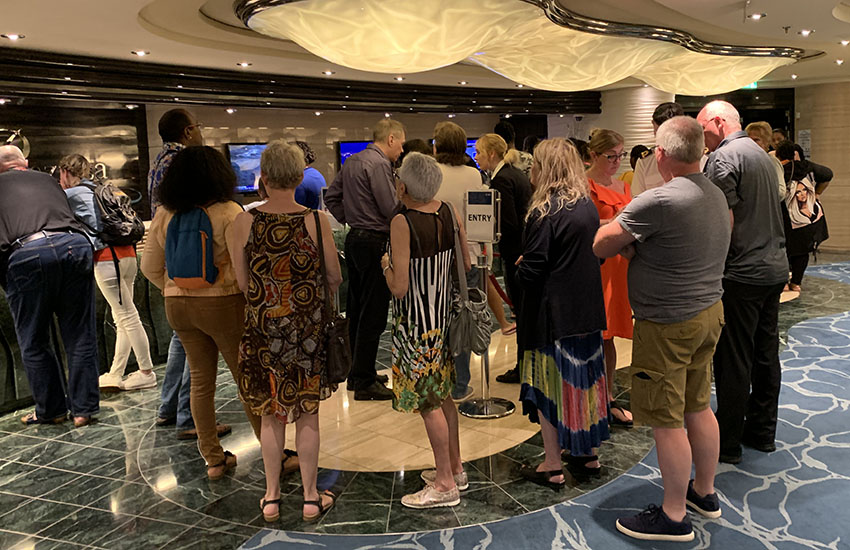
After two hours, I made it to the front of the line. The crew members at the front desk were exhausted. I explained that I already had an outbound plane ticket for today and only needed my disembarkment papers. He printed me off the papers and told me I was welcome to enjoy the buffet before I left. I told him I planned to get off the ship immediately. He gave me a knowing look that showed he felt the same way. I ran, bag in hand, to the nearest disembarkment center. I felt terribly for everyone around me. Everyone was in a bad spot, especially the crew who were being de-prioritized compared to the passengers.
A crewmember immediately blocked my exit. I showed him my papers, and he looked at me unconvinced. I showed him my electronic flight boarding pass and explained I needed to catch my flight. He looked around at the growing crowd and told me he’d need to check with his manager. He walked away.
Two very long feeling moments later, he returned. “You are just a party of one, right?”. I nodded enthusiastically. He eyed me and then opened the velvet ropes to let me pass.
I sprinted down the stairs and was stopped by a crew member operating a thermal camera. I was scanned, okayed, and then shown to a gangplank.
Before stepping off the ship, another crew member stopped me. The dock was only 10 feet away.
He looked at my paperwork and then scanned my cruise card.
Immediately, a notification appeared on his monitor.
He very quickly closed the gate in front of me and said that something was wrong. “You aren’t supposed to get off for another week,” he said accusingly.
With obvious frustration, I explained that that was true earlier, but now the remainder of the cruise had been canceled. Not convinced, the guard relocked the already locked gate and then continued pressing keys into his computer.
We both waited at a standstill.
The overwhelmed computer slowly processed information.
The crewman looked genuinely surprised, “Hmm.. it appears you can go.”
He opened the gate, and I sprinted down the gangplank and down the dock toward land.
From the dock, I saw another cruise ship anchored far out in the bay. It hadn’t been allowed entry into the country and was stopped, all passengers quarantined until the ship could find a country that would allow it to release its passengers. I later found out that ships like that one were required to return all the way back to their home ports in order for the passengers to disembark. In some cases, this meant unexpected sessions all the way from the Caribbean to the United Kingdom.
Looking back at my ship, I thought about the many people left on-board. Most of them were not going to be allowed to disembark in Martinique, and I thought it was unlikely that they would be able to disembark at their intended destinations that were now 24 and 48 hours away. The world was spinning downward. Unlike the previous cruise ships in San Francisco and Japan, potentially infected cruise ship passengers were no longer a priority for the media or politicians.
When I made it to the parking lot, there was only a single taxi. The driver spoke no English. I pointed to the rate meter. The taxi driver faked confusion, “Error, broke.”
Still gripping my bag, I started to walk away.
Frantically, he changed his mind, “meter is okay, works.”
I got into the taxi and placed my luggage next to me on the seat. As I passed through a city that would soon be in full lockdown, the meter in my cab ran normally. We got to the airport, and the meter read 30 euro. Dumbfounded, I realized I had been wrong. The taxi driver at the beginning of my trip hadn’t ripped me off after all.
A day and a half later, I arrived home in Seattle and entered 14-day quarantine. As I once again lay on my back, this time alone in my basement, I reflected.
I had been one of the lucky ones.

